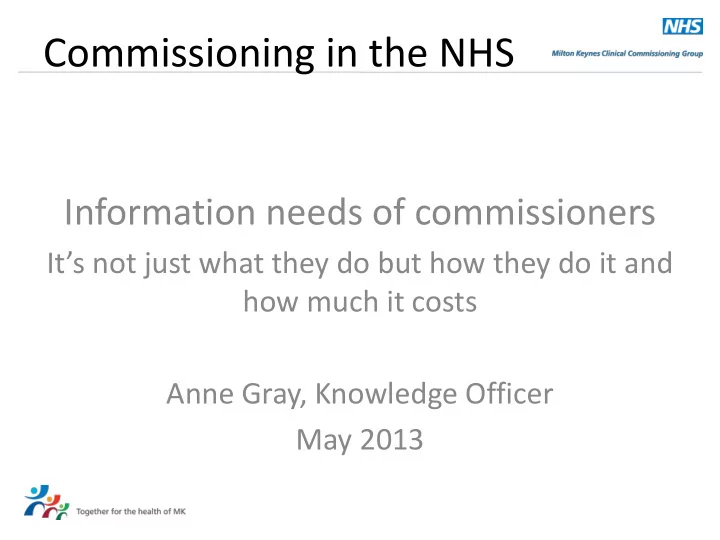

Commissioning in the NHS Information needs of commissioners It’s not just what they do but how they do it and how much it costs Anne Gray, Knowledge Officer May 2013
Local HealthWatch Structure of the NHS CCGs Clinical Research Networks NHS E ATs LAs
Relationship between organisations Advice and performance management
Relationship between organisations Regulating and monitoring the quality of services
Clinical Commissioning Groups • Consortia of general practices with responsibility for commissioning local health services across England. • Commissioning responsibilities include: – planning services, based on assessing the needs of the local population; • planned and emergency hospital care, • rehabilitation, • most community services and mental health and learning disability services. – securing services that meet those needs – monitoring the quality of care provided.
Business needs • CCGs are businesses whose members are themselves small businesses – Requirements from authorisation eg financial management, leadership, capacity, sustainability, innovation – Activity in General Practice (eg referrals) is central to managing activity but GP (primary care) contracts are managed by NHS England NOT CCGs
Information needs assessments 1. NHS Staff survey 2005 2. The Intelligent Practice: Understanding the information needs of GP commissioners (Dr Foster 2007) 3. NHS Networks survey to support development of Commissioning Zone 2010 4. Commissioning Intelligence model -government engagement exercise 2011 And finally - • Information needs around commissioning – presentation by Dr Andrew Jones, BMJ
NLH NHS Staff user survey (tfpl 2005) Re: service development in primary care Managers want information Format abou t • Summarised information • government policy and and structured enabling guidance readers to move quickly from high level information • regulations to detail. • news Alerting services • statistics and demographics • Highly valued • clinical/scientific/and • Important to minimise the technical information, risk of missing critical • information about projects information both for NHS being undertaken by other and external information. trusts.
NHS Networks survey 2010 • Support development of Commissioning Zone – 87 GPs, 133 PCT, 42 others • Most useful types of information 1. Case studies 2. Templates/business studies 3. Practical guides 4. Official expert guidance 5. Analytical tools 6. Legislation 7. Frameworks 8. Research • Both push (eg email) and pull content important (eg online)
The Intelligent Practice Dr Foster • Published 2007 to support Practice Based Commissioning (ie before recent health service reorganisation) • Intelligent information required - – Strategy – health needs, market intelligence – Choice & quality – patient experience – Activity & finance http://drfosterintelligence.co.uk/wp-content/uploads/2011/06/Intelligent-Practice-2007.pdf
NHS Networks contd/ - User wish list • A single source of information • Powerful search tools • Email alerts • Access to reliable up to date source data • A range of templates, frameworks adaptable for local use • Case studies and examples of good practice • “concise well written information”
NHS Networks contd/ - Key information requirements • Understand local population • needs assessment, demographics, health impact assessment, equality assessment, public health info, mortality • Services • How they are used, case studies and how to develop locally, cost benefit, quality, prioritisation • Clinical evidence • Guidelines, service specs, competencies
Commissioning Intelligence Model • Feedback on the results of a large-scale government engagement exercise to understand the information and intelligence requirements of emerging CCGs • Largely concerns data and intelligence eg clinical and financial data integration tools; population and patient risk stratification; data warehousing solutions; and urgent care dashboards • Includes important supporting Services, Tools and Data
Commissioning Intelligence Model contd/ Segments: Information /skills required included: 1. How healthy? • Specialist knowledge of 2. What's really happening in this system? evidence sources and research 3. How much? • Identify tools 4. How do we compare? 5. Are my providers delivering • Local population health what they agreed? • What have other people 6. How could things be better? done? - incl £, KPIs 7. What difference have we made? 8. What are our future plans?
To summarise: Content • Authorisation • Government policy/ legislation and guidance • Expert guidance, templates, frameworks • Current services (both local and national) - activity & financial data and analytical tools • Understand the population – statistics, demographics, health needs and risk stratification • Market intelligence • Choice & quality – patient experience • Case studies and examples of good practice • Research and clinical evidence - Guidelines, service specifications, competencies
To summarise: Format • A single source of information with search tools • Practical guides • Summarised and structured enabling readers to move quickly from high level information to detail • Alerting services around all of the above – Key to minimise the risk of missing critical information (NHS and external)
How does the information fit together: Commissioning Cycle
Briefing for GPs Commissioning Show 2012, Dr Andrew Jones BMJ Assessing Needs Data Prevalence Morbidity & mortality Risk factors & lifestyle Clinical Service access Commissioning Capabilities Segment & trend analysis ‘Market’ Intelligence Tools Data collection & reporting
Design Service & Pathway Knowledge Existing pathways Evidence synthesis Evidence summaries for single interventions Clinical Commissioning HTAs Capabilities Pathway adaptation Pathway development Guideline enablement
Clinical Decision Making Knowledge Best practice guidance Guidelines Pathways Clinical Tools Commissioning Referential decision support Order sets / care bundles Clinical prompts Integrated decision support ‘Just in time’ learning
Sources: • NHS Staff survey 2005 Information needs and concerns of NHS staff in order to inform the programme of work to deliver the National Library of Health http://nlhcms.library.nhs.uk/nlhdocs/NHS_user_survey_final_report.pdf • The Intelligent Practice: Understanding the information needs of GP commissioners (Dr Foster 2007) http://drfosterintelligence.co.uk/wp-content/uploads/2011/06/Intelligent- Practice-2007.pdf • NHS Networks survey to support development of Commissioning Zone 2010 http://commissioning.pbworks.com/w/file/43994424/Info%20needs%20of%20co mmissioners%20survey%20Analysis%20of%20responsesv11-7-10.pdf • Commissioning Intelligence model – based on a government engagement exercise 2011 http://www.england.nhs.uk/2012/02/03/commissioning-intelligence-report/ • The Commissioning Cycle - a summary for GPs A presentation outlining the stages of the cycle, with a description of the knowledge, capabilities, tools and data available to support those stages. Based on a presentation by Dr Andrew Jones, BMJ at Commissioning Show 2012 http://www.miltonkeynesccg.nhs.uk/resources/uploads/files/Commissioning%20C ycle%20for%20GPs.ppt
Recommend
More recommend